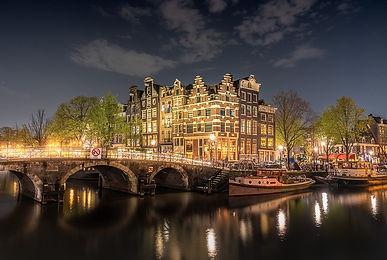Private Dutch tutors in London and online
Whether you're learning for GCSE, A Level or just for fun — try our inspirational Dutch tutoring!
Why should I learn Dutch?
by Daniela
The Netherlands is one of the UK’s closest neighbouring countries, so it comes as no surprise that Dutch is consistently one of the languages most frequently requested by UK employers. The Dutch market welcomes foreigners, and there are plenty moving to the Netherlands for work.
Although most Dutch people speak English, the best way to understand the culture and make the most of your time there is by knowing even the basics of the language. Don’t be surprised if, upon hearing that you live in the country, a Dutch person will start questioning your language skills!


Who speaks Dutch?
Dutch is spoken by nearly 23 million people worldwide, being the official language of The Netherlands, Belgium, Suriname, and the Caribbean islands of Aruba, Curacao and Sint Maarten.
But that’s not all! If you speak Dutch and are chatting with someone from South Africa, you will be able to understand them. Officially, the language is called Afrikaans, but it is of Dutch origin. Not only that, but due to the Netherlands’ history of settlers and colonies in previous centuries, you will find quite a large number of Dutch speakers in Canada, the United States or Indonesia.
There are plenty of Dutch people who decide to move abroad with jobs or to start small businesses, so don’t be surprised if you come across the Dutch language where you least expect it. The Dutch are proud of their pioneering mentality; you’ll easily find an opportunity to practice the language with someone nearby.
How hard is it?
Good news! The Dutch language shares many similarities to English, positioning itself between English and German. In fact, if you do speak or have studied German before, learning Dutch might be a breeze. The vocabulary is very intuitive, and you will find that English and Dutch share plenty of words. Furthermore, many English loanwords keep the same spelling and pronunciation when translated to Dutch.
But, as with any language, there is also a catch or two. For example, the articles ‘de’ and ‘het’ (equivalent of ‘the’ in English) have no grammatical rule, so you’ll have to learn by heart which article each noun takes. Dutch sentences place the verb at the end, which takes some time getting used to. There are also words with no direct translation in English, such as the so-called modal particles – ‘nou’,’ toch’, ‘nog’, ‘maar’, ‘eens’, ‘even’ – and these alter the meaning of a sentence, making a command more direct, nicer, more urgent etc.
Speaking Dutch could seem tricky, with some sounds proving difficult, such as the ‘r’, the hard ‘g’, the ‘sch’ and the ‘ij’. Try pronouncing all of them in one word: ‘verschrikkelijk’ (‘terrible’ in English).
Dutch people love to show their English language skills, so don’t be surprised that, upon hearing that you’re not a Dutch native, they will switch to English. Especially in Amsterdam, practising Dutch might seem like a challenge. Be persistent and show off your Dutch skills.
Here is a word comparison between German, Dutch and English.
Tongue twisters!
Popular beliefs claim that the words ‘Scheveningen’, ‘schoenen’, ‘schaatsen’ (Scheveningen, shoes, skates), were used during World War II to identify German spies, as they would pronounce the ‘sch’ sounds differently than the Dutch.
Try pronouncing ‘Meervoudigepersoonlijkheidsstoornissen’! It’s the longest word in the Van Dale Dutch dictionary, meaning ‘multiple personality disorders’.
What about reading this sentence: ‘Kapper Knap, de knappe kapper, knipt en kapt heel knap, maar de knecht van kapper Knap, de knappe kapper, knipt en kapt nog knapper dan kapper Knap, de knappe kapper.’, meaning ‘Barber Knap, the handsome hairdresser, cuts and cuts very cleverly, but the servant of hairdresser Knap, the handsome hairdresser, cuts and cuts even better than hairdresser Knap, the handsome hairdresser.’

The 'Untourist' guide to Amsterdam
The Netherlands is one of the most popular destinations from the UK. With about 30 flights a day, plus several train, ferry and coach options too, Amsterdam is in easy reach from the UK, making this city perfect for a weekend break regardless of the season. If you’re thinking pretty canals, colourful tulips, tons of bicycles, mouth-watering cheese, seedy Red Light District, you’re not far off, but Amsterdam has a lot more to offer.
For those wanting to avoid the tourist traps, the Dutch have come up with the Untourist initiative. In a fake wedding ceremony, you can marry an Amsterdammer and spend the day discovering the city through a local’s knowledge. Although this is an initiative with limited availability, you can also grab a copy of the Untourist Guide to Amsterdam, for a more creative take on exploring Amsterdam.

We offer Dutch tutoring at a wide variety of levels, from young learners to older learners (GCSE, IGCSE, A Level, IB, Pre-U, etc.) and even to adult learners (those doing undergraduates or Masters courses, or learning just for fun).
Our qualified Dutch tutors have been hand-picked by teaching experts (our longest-standing, most successful tutors, some of whom are PGCE qualified teachers) in our thorough selection process.
We offer varied Dutch tuition rates to suit all budgets, with prices depending on the tutors' qualifications and their total number of hours of private tuition or classroom teaching experience.
Let us find you a Dutch tutor to inspire you and get you back on track! Contact us today.





